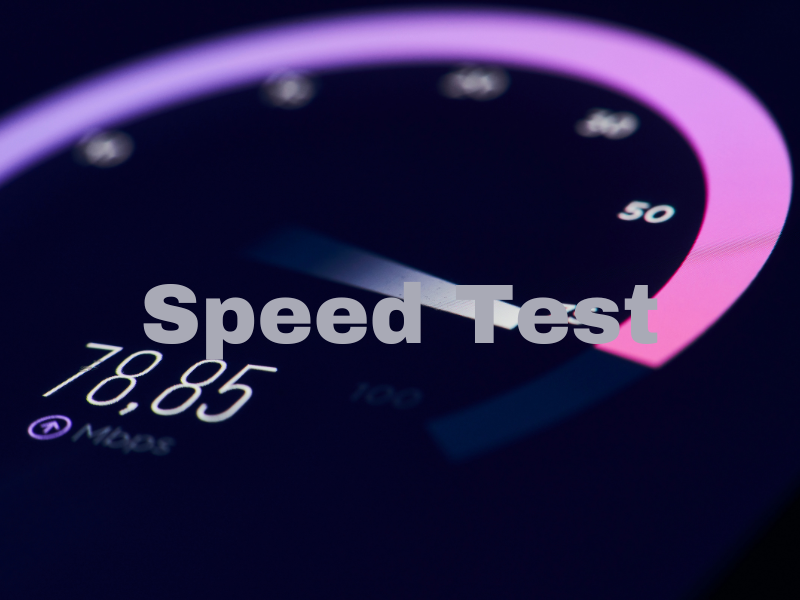Table of Contents
ToggleIntroduction
In today’s digital age, having a reliable internet connection is crucial. Whether you’re working from home, streaming your favorite shows, or gaming online, internet speed can significantly impact your experience. But how do you know if you’re getting the speeds you need? That’s where internet speed tests come in. Let’s dive into what they are, how they work, and why they’re essential.
How Internet Speed Tests Work
The Basics of Speed Testing
Internet speed tests measure the rate at which data is downloaded and uploaded from your device to the internet. They also check your connection’s latency (ping) and variability (jitter). These metrics help you understand the performance of your internet connection.
Key Metrics: Download, Upload, Ping, and Jitter
- Download Speed: The rate at which data is transferred from the internet to your device.
- Upload Speed: The rate at which data is transferred from your device to the internet.
- Ping: The time it takes for a data packet to travel from your device to a server and back.
- Jitter: The variability in ping over a series of tests, indicating stability.
Types of Internet Speed Tests
Web-Based Speed Tests
These tests are conducted through a browser. They are convenient and don’t require additional software. Popular web-based speed tests include Ookla Speedtest and Fast.com.
App-Based Speed Tests
These tests are performed using applications installed on your device. They often provide more detailed information and additional features.
ISP-Provided Speed Tests
Many Internet Service Providers (ISPs) offer their own speed tests. These are tailored to their network infrastructure and can be more accurate for their connections.
Popular Internet Speed Test Tools
Ookla Speedtest
Ookla Speedtest is one of the most popular and reliable speed test tools available. It provides detailed information about your download, upload, ping, and jitter.
Fast.com by Netflix
Fast.com is a simple, easy-to-use speed test provided by Netflix. It primarily focuses on download speed, which is critical for streaming services.
Google Speed Test
Google offers a built-in speed test that is quick and straightforward to use, accessible directly from the search engine.
SpeedOf.Me
SpeedOf.Me is a web-based test that uses HTML5 technology, making it suitable for testing on mobile devices without requiring a flash or app download.
How to Conduct an Accurate Speed Test
Preparing for the Test
Ensure no other devices are using the internet connection during the test. Close unnecessary applications and disconnect VPNs for more accurate results.
Steps to Perform the Test
- Choose a reliable speed test tool.
- Connect your device directly to your router via Ethernet for the best results.
- Run the test and note the download, upload, ping, and jitter values.
Interpreting Results
Compare the test results with the speeds promised by your ISP. Note any significant discrepancies, which could indicate issues with your connection or service.
Factors Affecting Internet Speed
Connection Type (Fiber, DSL, Cable, Satellite)
Different types of internet connections offer varying speeds and stability. Fiber optic connections typically provide the fastest and most reliable speeds.
Network Congestion
During peak usage times, network congestion can slow down your internet speed. Testing during different times of the day can give you a better idea of your connection’s performance.
Hardware Limitations
Old or outdated routers, modems, and devices can bottleneck your internet speed. Ensure your equipment is up to date to maximize performance.
Distance from Router
The farther you are from your router, the weaker the signal and the slower your internet speed. Consider placing your router in a central location or using range extenders.
Improving Your Internet Speed
Optimizing Your Router
Position
your router in a central location, away from obstructions and electronic devices that might cause interference. Updating the router’s firmware can also improve performance.
Reducing Interference
Avoid placing your router near devices that emit wireless signals, such as microwaves or cordless phones. Using a different Wi-Fi channel can also help reduce interference.
Upgrading Your Equipment
Invest in a modern router and modem that support the latest internet technologies. This can significantly enhance your internet speed and stability.
Choosing the Right ISP Plan
Ensure your ISP plan meets your usage needs. Higher bandwidth plans are essential for households with multiple users and devices.
Understanding Your Internet Plan
What ISPs Promise vs. Actual Speeds
ISPs often advertise “up to” speeds, which are the maximum speeds you might experience. Actual speeds can vary due to network congestion, infrastructure quality, and other factors.
Data Caps and Throttling
Some ISPs impose data caps, limiting the amount of data you can use per month. Throttling occurs when your ISP intentionally slows down your internet after reaching a certain data limit.
Comparing Different ISP Plans
Compare plans from various ISPs to find the best value. Look for plans that offer high speeds, minimal throttling, and no data caps.
Common Internet Speed Issues and Solutions
Slow Download/Upload Speeds
If you experience slow speeds, try resetting your router, checking for malware, and ensuring no other devices are hogging the bandwidth. Contact your ISP if the problem persists.
High Ping and Latency
High ping can be a result of network congestion or poor routing. Use a wired connection and close unnecessary applications to reduce latency.
Frequent Disconnects
Frequent disconnects can be due to faulty hardware or network issues. Check your cables, update your firmware, and contact your ISP if necessary.
Internet Speed for Different Activities
Streaming Video
For streaming HD video, you’ll need at least 5 Mbps. For 4K streaming, aim for 25 Mbps or higher.
Online Gaming
Gaming requires low ping and stable connections. A speed of 3-6 Mbps is generally sufficient, but lower latency is more critical.
Video Conferencing
Video calls require both good download and upload speeds. Aim for at least 1.5 Mbps for HD video calls.
Downloading Large Files
For downloading large files, higher download speeds (50 Mbps or more) will save you significant time.
The Future of Internet Speeds
5G and Beyond
5G technology promises ultra-fast speeds and low latency, revolutionizing mobile internet use. Future developments in 5G will bring even more improvements.
Fiber Optics Expansion
The expansion of fiber optics will continue to enhance internet speeds and reliability, offering gigabit speeds to more homes and businesses.
Satellite Internet Advances
Advances in satellite internet technology, like SpaceX’s Starlink, are making high-speed internet accessible in remote areas where traditional connections are unavailable.
Legal and Privacy Considerations
Data Privacy During Speed Tests
Be cautious about the personal data you share when using speed test tools. Choose reputable providers to ensure your data is protected.
Legal Regulations on Internet Speeds
Regulations vary by country and region. Familiarize yourself with local laws to understand your rights regarding internet speed and service quality.
Conclusion
Internet speed tests are an essential tool for ensuring you’re getting the performance you need from your internet connection. By understanding how these tests work and how to interpret their results, you can make informed decisions to improve your internet experience. Whether it’s upgrading your equipment, optimizing your setup, or choosing the right ISP plan, there’s always something you can do to enhance your online activities.
FAQs
How Often Should I Test My Internet Speed?
Testing your internet speed once a month is a good practice. Additionally, test whenever you notice a significant drop in performance.
Are Free Speed Tests Reliable?
Yes, free speed tests from reputable providers are generally reliable. However, for the most accurate results, use a wired connection and choose a well-known testing tool.
Can My ISP Manipulate Speed Test Results?
While rare, some ISPs may prioritize traffic to popular speed test sites. To get a more accurate picture, test using different tools and at various times.
What Should I Do If My Speed Is Lower Than Promised?
First, try troubleshooting steps like resetting your router and checking for interference. If speeds are still low, contact your ISP to address the issue.
Does Time of Day Affect Internet Speed?
Yes, internet speeds can vary depending on the time of day. Peak usage times, typically evenings, can result in slower speeds due to network congestion.




















